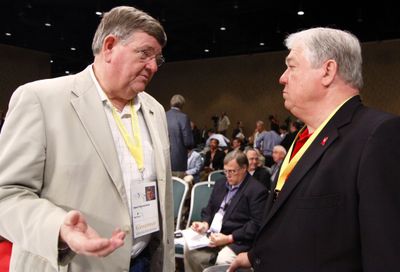GOP looking again to Haley Barbour
Former RNC chairman’s political savvy admired

BILOXI, Miss. – Mississippi Gov. Haley Barbour was Republican National Committee chairman the last time his party was at such a low, after the election of 1992. Two years later, Republicans captured control of Congress, and although Newt Gingrich, who became the new House speaker, got much of the credit, party insiders say Barbour played a major role.
Sixteen years later, Republicans are looking to Barbour to help lead them back once more. It is perhaps ironic that, at a time of generational change in politics, an elder statesman such as Barbour, 61, is once again poised to play a pivotal role for his party, this time in the elections of 2009 and 2010. And although he says a presidential candidacy in 2012 is not likely, Barbour has refused to shut the door on speculation that he is interested.
This weekend, he is playing host to a meeting of the National Governors Association, a gathering of bipartisanship and bonhomie that is allowing him to show off how the Mississippi Gulf Coast has recovered under his leadership since Hurricane Katrina struck in August 2005. Once the meeting ends, he will turn back to partisan politics in his new assignment as chairman of the Republican Governors Association.
Over the next two years, Barbour will oversee the party’s efforts in more than three dozen gubernatorial races, beginning this fall with attempts to capture Democrat-held governorships in Virginia and New Jersey.
Barbour knows all the reasons for the party’s plight, but he argues that Republicans are not as bad off as the worst assessments suggest. Inside the party, his analysis and prescriptions are likely to be widely followed.
He worries that some Republicans see ideological purity as the route back, and argues that, if anything, the GOP must become more inclusive, not less.
“When you lose, there are some people who say, ‘Well, now’s the time to get pure,’ ” he said. “Well, purity in politics is about losing. Politics is about addition and multiplication; purity is about subtraction and division. … You have to remember that now is the time to have the most open of doors.”
Barbour brings a number of potential liabilities to any role as the face of the party. His Southern drawl reinforces the image of a party that has become, in the estimation of many analysts, too Southern-based. He is hardly a fresh face for a repackaged GOP, having been in the thick of national politics for nearly three decades, including a stint as Ronald Reagan’s White House political director. He was also one of Washington’s most prominent and successful lobbyists, the very kind of people Barack Obama railed against last year.
But his assets make him especially attractive to fellow Republicans. He is an aggressive and effective partisan advocate who knows how to mix humor with political attack. He has a vast network and is respected by many Democratic adversaries. He is as comfortable talking about the details of the House energy bill as he is about the metrics of an effective political campaign.
And to his long resume as a Washington insider, he adds two terms as a governor and praise for his handling of Katrina’s aftermath. Other Republicans look to him for advice, guidance and leadership.
“If you’re trying to demonstrate the importance of something on the Republican side, having Haley’s name in the mix goes a long way,” said Ed Gillespie, a former party chairman and Barbour’s friend and mentor.
Barbour acknowledges that Republicans have done little to help themselves in the six months Obama has been in office. But he believes, as do others in the party, that Obama’s ambitious policies are providing an opening for the GOP to come back.
In recent weeks, Republicans have become more aggressive in seeking to portray Obama as an advocate of economic, health care and energy policies that will give government too much power, explode the deficit and hurt business. Barbour articulates the case with an especially sharp edge, and said Obama is “far to the left of anybody else who’s been elected president (or) who’s ever run for president on a major-party ticket.” He said Obama’s policies are running up spending “that a year ago was just unthinkable.”
White House senior adviser David Axelrod called Barbour’s comments hyperbole, manufactured for Republican consumption. “Sounds like a guy who’s running for the Republican nomination for president,” Axelrod said.
For Barbour, thoughts of 2012 are on hold. But the RGA chairmanship affords him the opportunity to travel the country and gauge firsthand whether he should run.
“At the end of 2010, I’ll have a reasonable assessment of the mood of the country, of what ought to be and what ought not to be done,” he said. “Any Republican who’s not focused on (2009 and 2010) doesn’t have his eye on the ball. I’ve given thousands of people that advice, and I’ve taken my own advice.”
Barbour has long been one of the GOP’s shrewdest strategists. “He knows when to strike, how to strike,” said Don Fierce, who was part of Barbour’s RNC team in the early 1990s.
Barbour said he is “not Pollyannaish” about a quick comeback, noting that Obama is a formidable opponent. “He has all the charm that (Bill) Clinton does, plus he has the advantage of being an African-American,” Barbour said.
Elaborating, he said: “I think that most Americans are proud of the fact that America elected an African-American president, that out of our past was slavery and the civil rights movement, and this makes a very positive statement about America.”
He said he also has high regard for Obama’s political team. “They’re tough as nails,” he said. “This the first White House since (Richard) Nixon that K Street is afraid of.”